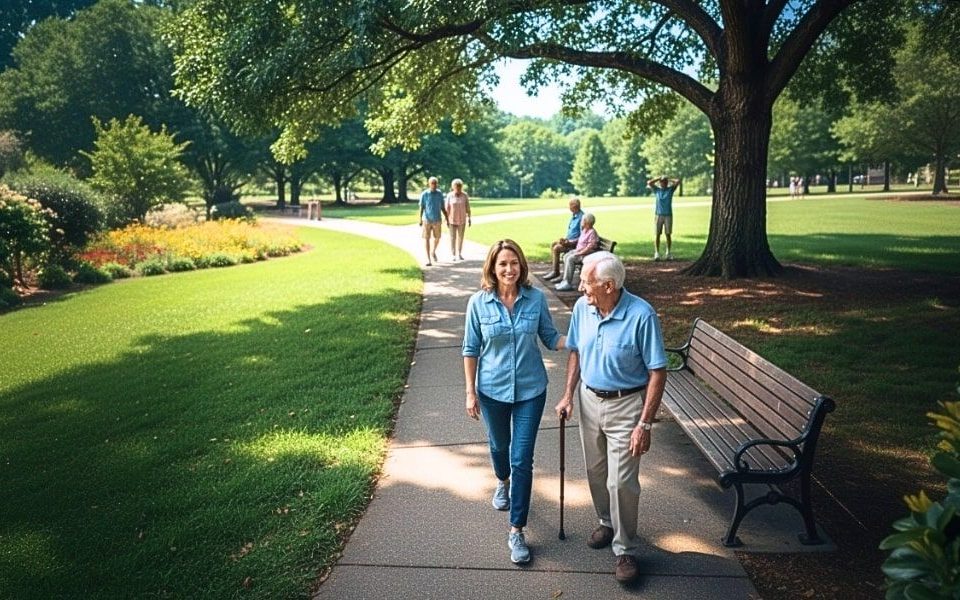
Sleep challenges for seniors often leave families searching for answers. You may notice your parent waking up at night, feeling restless, or struggling with early mornings. These changes may seem minor at first, but over time, they can impact energy, mood, and overall health. As a loving family member, watching your parent struggle can feel distressing.
This post explains common causes of senior sleep challenges and offers practical ways to support healthier rest.
Understanding Sleep Challenges for Seniors
Normal Sleep Changes with Aging
As people age, their sleep patterns naturally shift. Seniors often spend less time in deep sleep, which makes rest feel less refreshing. Many also wake earlier than they once did and may struggle to return to sleep after waking during the night. Nearly half of adults over 60 report some form of sleep disturbance, showing just how widespread the issue can be.
Medical and Lifestyle Causes of Insomnia
Insomnia in seniors often stems from underlying health conditions. Arthritis pain, heart problems, or breathing difficulties can interrupt rest. Medications prescribed for blood pressure, mood, or inflammation sometimes have side effects that make sleep harder.
Emotional factors also matter. Grief, anxiety, and depression are common in later years and can keep the mind active when it should be winding down. Lifestyle habits, such as irregular bedtimes, caffeine too late in the day, or limited activity, can further complicate healthy sleep.
Sleep Disorders Beyond Insomnia
Some sleep challenges go beyond basic insomnia. Seniors may face medical sleep disorders that require evaluation and treatment, including:
- Sleep apnea affects nearly one in five adults. It causes pauses in breathing during sleep, which can lead to loud snoring, morning headaches, and daytime fatigue. Untreated sleep apnea increases the risk of cardiovascular problems and memory issues.
- Restless leg syndrome creates uncomfortable sensations in the legs that worsen at night. Many seniors describe it as a tingling or crawling sensation that makes it difficult to stay still. This condition can make it hard to fall asleep and can lead to frequent sleep interruptions.
- REM sleep behavior disorder often appears in seniors with neurological conditions such as Parkinson’s. It causes vivid dreams paired with sudden movements, which may be confusing or even dangerous.
Recognizing these issues early and working with a doctor can greatly improve a senior’s quality of sleep and overall health.
Daily Habits That Support Restful Sleep
Routine plays a powerful role in sleep health. Going to bed and waking up at the same time every day helps regulate the body’s internal clock.
Seniors benefit from limiting naps to short periods earlier in the day, since long or late naps interfere with nighttime rest.
Creating calming bedtime rituals, such as reading quietly or listening to soft music, signals to the body that it is time to wind down. A bedroom that is dark, quiet, and comfortably cool also supports restful sleep.
Nutrition and Activity Adjustments
What your parent eats throughout the day matters more than many realize. Evening caffeine and alcohol can disrupt sleep cycles, so limiting both makes a difference. Heavy meals late in the evening often cause discomfort, while lighter meals help avoid indigestion at bedtime.
Physical activity also contributes to healthier sleep. Gentle exercises such as walking, tai chi, or chair yoga can boost energy during the day and promote deeper rest at night. Exposure to natural light, even for brief periods, helps to strengthen the circadian rhythm.
Relaxation and Stress Management
Stress management is another key to better sleep. Many seniors find relief in simple relaxation techniques. Deep breathing, meditation, or gentle stretching can prepare the body for rest. Journaling is another tool. It allows thoughts and worries to move from the mind onto paper. These simple practices cultivate a calmer mindset, making it easier to fall asleep.
Professional and Medical Support
Sometimes, healthy routines are not enough, and professional guidance becomes necessary.
Cognitive Behavioral Therapy for Insomnia, or CBT-I, is considered the safest and most effective long-term treatment. Doctors may also recommend a sleep study if conditions such as sleep apnea are suspected.
While over-the-counter sleep aids or supplements (like melatonin) may seem like easy solutions, they can interact with other medications. It is always best to consult a physician before trying them.
Caregiver and Community Roles in Healthy Sleep
Caregivers play a crucial role in promoting healthy sleep habits. They can observe patterns, encourage routines, and create structure that promotes better rest. Daytime activities, such as social programs or light exercise, also help reduce restlessness at night.
Senior living communities provide structured schedules and safe environments. These settings support natural sleep cycles through consistent routines and engaging activities.
Common Questions About Senior Sleep Problems
How much sleep should seniors get each night?
Most older adults require seven to eight hours of quality sleep each day.
Is insomnia a normal part of aging?
No. Some changes in sleep patterns are natural, but persistent insomnia indicates a problem that warrants attention.
Can exercise improve sleep for seniors?
Yes. Regular physical activity helps promote deeper sleep and improve overall sleep quality.
What should I do if my parent snores loudly?
Frequent, loud snoring can be a sign of sleep apnea, which requires a medical evaluation.
Are over-the-counter sleep aids safe for seniors?
Not always. Many can cause side effects or interact with other medications. Seek medical guidance before introducing any sleep aids.
Support Your Loved One with Bethel Gardens
Better sleep leads to better health for seniors. At Bethel Gardens, we provide structured routines, engaging activities, and compassionate care that help residents rest more easily.
Contact us today to discover how our community can help support your parents’ overall well-being.



